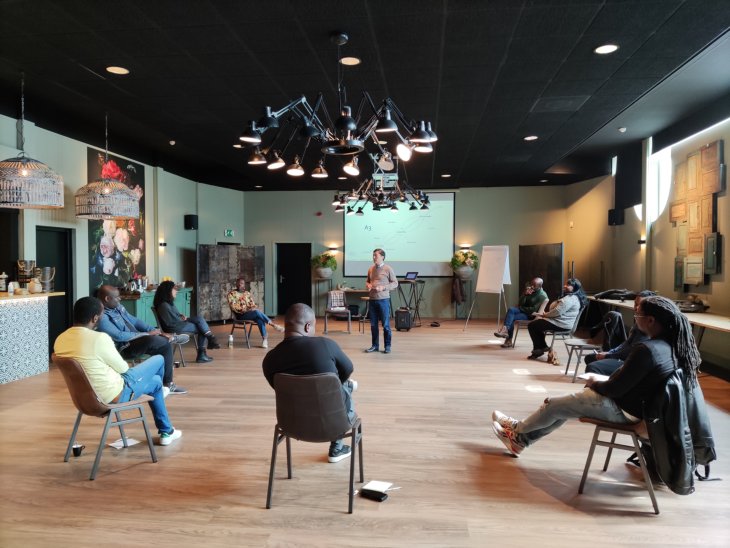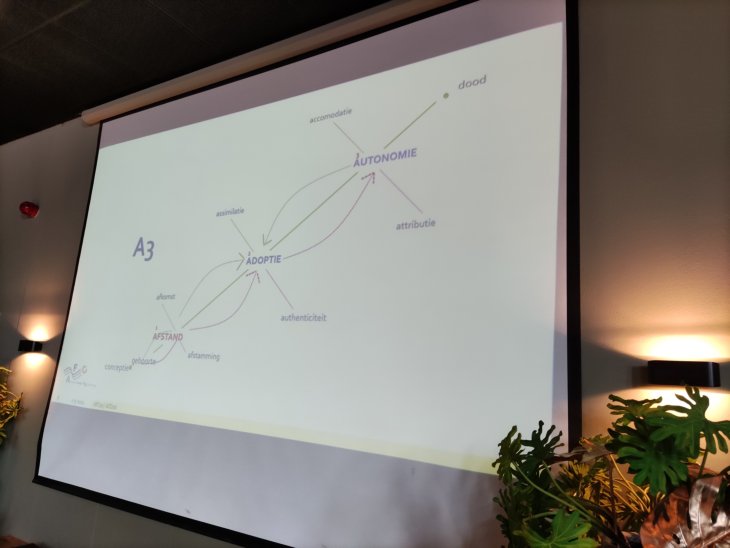Session Relinquishment Adoption Autonomy
George Jean Joseph, 37, check-up (Rotterdam). That was my answer to the first question / assignment from Hilbrand Westra, the well-known adoption coach: 'write down your name or write down what you want to be called, how old you are, what do you want to achieve with this session and where you live'.

With me in the session 9 adoptees from Haiti in the age category 25-45. Each with their own life story, their own relationships and roles in life (parent of, partner, single, self-employed, employee, student) and also their own goals to get out of the session. The common denominator was being adopted from Haiti.
I myself came to the session skeptical: yes, I was adopted, but I usually feel good, have a nice permanent job, great home, quite a few friends and family with whom I get along well. In short, I'm going well. Why should I do a psychological session? I have no major problems and certainly do not intend to let problems talk to me.
I did promise myself in advance; I go into it critically but open-minded, then I learn the most and I can 'check' whether I am psychologically well.
The theme of the session was: relinquishment, adoption and autonomy. Relinquishment means the moment you leave from - in our case - Haiti, a traumatic event if you think about it carefully. By adoption is meant the process / phase from the moment you arrive in the Netherlands and you have to find your way in the Netherlands and how you do that. I would translate the process of autonomy into how you as a person (would) like to function in the world. As a participant, I do not dare and cannot properly describe the theoretical part because I am not a professional and you really have to hear and experience it yourself.

For me, the whole session was a 'celebration' of recognition from start to finish (which may not really be a party). The ways I live life; how I interact with friends and family; that I sometimes come home and feel empty because I have given too much at work or in contact with others. My behaviors and choices in past relationships, my choices in my relationship now. Much of my behavior can - to my surprise - be placed in the theoretical framework.
The theoretical framework that was skilfully sketched by Hilbrand Westra; not only as dry curriculum but also with images, examples and probing questions and an impressive use of family constellations with the group (google it if you want to know what that looks like).
And what a group! We have managed to create a safe environment. It does not fit here to talk about the experiences of others here. But what a great group. I felt at home, a kind of family feeling. The stories of others were all penetrating, recognizable, valuable and gave food for thought. Others asked questions that I was afraid to ask or that I had not thought of asking them, it was beautiful.
For me it meant more understanding why I sometimes have a certain emotion in a certain situation, it means being able to place my own behavior and (future) choices even better. I can also understand the behavior of others - adopted or not - as a result of my own behavior. I may even be able to talk about it with those close to me that I think it is important that they know how it works.
It is of course not a miracle that I have already finished the entire Matrix (don't you understand this comparison, watch the Matrix). As a man, of course I also want direct handles / solutions, but on the journey back I actually thought: just being able to understand a feeling or emotion within, where it comes from and that the feeling the emotion may 'be' there and the giving space, regardless of what others think about it, gives a little more peace of mind and thus offers a first handle.
The check-up:
My passport states George Jean Joseph Schuddebeurs, born January 16, 1984 in Port-au-Prince. A few years ago I found out that the names Jean Joseph and my birthday, which I thought were either from my biological mother or Haiti hospital nurses, were "made up" in the adoption process. What is still really about me I sometimes said out loud. It has brought me a lot of grief, pain and anger because I proudly bore the names George Jean Joseph. I had to re-appropriate those names, which unconsciously took quite a lot of time and energy. Slowly they are my names again and I am wearing them again with pride.
I live in a world that is not mine by nature, I am not on my own ground. Deep down I know that and that there is a loss that I always keep feeling. I play down this feeling, out of fear: I don't have time to collapse, who knows, I might never recover. Moreover: my ancestors have experienced worse things and were the first colony to free themselves from slavery, that Haitian pride and power also lies within me, so who - or what - will try to make me small with such DNA in my genes?
I'm pretty good at participating in the Netherlands. I have a university degree, a good job, a nice girlfriend, good contacts with friends and family. My 'smile and wave mask' is 'on fleek'. The contact with other adoptees from Haiti is very good for me, we have one shared experience, which gives me support. The aim is clear and not really original: independence, freedom, love, joy, health. The session made me aware of another aspiration; Do not lose sight of your own 'I' in the pursuit of those other goals in life.